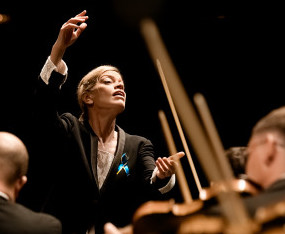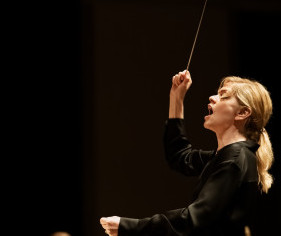Willis-Sørensen, Ukrainian Freedom Orchestra, Wilson, Cadogan Hall review - romantic resilience | reviews, news & interviews
Willis-Sørensen, Ukrainian Freedom Orchestra, Wilson, Cadogan Hall review - romantic resilience
Willis-Sørensen, Ukrainian Freedom Orchestra, Wilson, Cadogan Hall review - romantic resilience
Passion, and polish, from Kyiv's musical warriors

This week Vladimir Putin tried to murder my hosts in Ukraine. He failed. In more hopeful days, I spoke at a seminar organised by the British Council’s branch in Kyiv. Its offices (along with the EU delegation) felt the force of a Russian missile strike on Wednesday night. No one died there, thankfully, although 23 more civilians in the city perished.
As President Trump manoeuvres for a “deal” that would hand Putin most of his ill-gotten territorial gains on a silver platter, it was a bloody reminder that the Ukrainian Freedom Orchestra – launched as musical ambassadors for their beleaguered nation’s cause in summer 2022 – still, sadly, has every reason to travel, to play and to campaign. Under the baton of their Canadian-Ukrainian founder and music director, Keri-Lynn Wilson (pictured below), they came to Cadogan Hall last night for the closing gig of their fourth European tour.
 As before, they consist of an assembly of players drawn from Ukraine’s own symphonic and opera ensembles, and Ukrainian musicians based abroad. A special exemption frees the younger male members from military duties, but papers still need to be in order: this year one player, who didn’t have the necessary pass, was conscripted.
As before, they consist of an assembly of players drawn from Ukraine’s own symphonic and opera ensembles, and Ukrainian musicians based abroad. A special exemption frees the younger male members from military duties, but papers still need to be in order: this year one player, who didn’t have the necessary pass, was conscripted.
The UFO call this their “Resilience Tour”. After three-plus years of dogged cultural resistance to military aggression on a scale without parallel in post-1945 European history, that resilience sounds as powerful – and uplifting – as ever. This time, it took the form of a thunderous rendering of Beethoven’s Fifth, after a first half made up of the Prelude and Liebestod from Wagner’s Tristan und Isolde and, as an opener, a suite from a topical operatic work-in-progress rooted in the atrocities of Putin’s war: The Mothers of Kherson by Ukrainian composer Maxim Kolomiiets.
In late-apartheid era South Africa, writers and artists argued about the pros and cons of “solidarity criticism”: the kind of response that praises work for its values and aims more than for its actual achievement. I came to Cadogan Hall determined to avoid solidarity criticism, however noble the cause and stirring the occasion. And, to pick nits, there were a couple of moments when the brass sounded not quite up to the level of stellar strings and woods.
The UFO made a splendid big-boned sound in this modest hall, but might usefully have dialled down their heroic tutti once or twice. Still, any half-way objective listener would surely have found not just passionate commitment in every bar but genuine distinction in many desks: nowhere more reliably, perhaps, than in the smoky warm embrace of the cellos led by Artem Shmahaylo. From the first notes of the Wagner, their class and depth absolutely sang. Moreover, my initial sense that the brass stood slightly in the strings’ shade didn’t survive some deeply characterful playing from the horns – with Igor Szeligowski as principal – in Beethoven.
Commissioned by the Met in New York (Wilson is married to its general manager, Peter Gelb) and Polish National Opera, The Mothers of Kherson will tell the story of a group of Ukrainian women who went in search of their children, abducted by the Russian authorities in occupied Crimea. It begins with the jangling clashes and detonations of the battlefield (one can’t help but invoke Shostakovich here) but, after an innocent flute melody, finds a vein of yearning pastoralism that let those silken, but molten, strings shine. In this mood, I don’t really hear the legendary orchestral style of their big bullying neighbour in the UFO musical palette. If anything, they sound rather more Czech: a very good thing, of course. Kolomiiets’s idiom is eclectic and attractive, versatile but unafraid of bold traditional gestures. The premiere should be quite an event.
Keri-Lynn Wilson kept a tight grip on the Tristan music, and managed to make its quieter stretches almost as impassioned as the surging culmination. Giving voice to Isolde’s love-death was American soprano Rachel Willis-Sørensen. She brought nuance and flexibility as well as the necessary might to the princess’s oceanic ecstasy. Her forte passion never toppled into mere stridency. And Wilson skippered those world-class strings over the crest of their great wave with infectious zest.
 That zest turbo-charged the Fifth from the opening “Victory” call to an utterly exuberant – but not ragged or messy – finale. Especially in the andante, the brass answered my doubts with plenty of colourful and charismatic flourishes (when given a bouquet at the concert’s end, Wilson distributed the flowers among the blokes – they were all men – brandishing the metal at the back). Earthy but mellow as well, those cellos delighted in every movement, while the woods – with fine work from piccolo down to contrabassoon – caught the ear.
That zest turbo-charged the Fifth from the opening “Victory” call to an utterly exuberant – but not ragged or messy – finale. Especially in the andante, the brass answered my doubts with plenty of colourful and charismatic flourishes (when given a bouquet at the concert’s end, Wilson distributed the flowers among the blokes – they were all men – brandishing the metal at the back). Earthy but mellow as well, those cellos delighted in every movement, while the woods – with fine work from piccolo down to contrabassoon – caught the ear.
No one could overlook the extra-musical context of hearing this piece, from this ensemble, at this time. But there was much more here to appreciate than just a roaring affirmation of the will to win against cynical tyranny. From the suave dancing measures of the andante, properly “con moto”, to the effervescent wit as well as jubilant frenzy that drove the presto finale, we could enjoy – in Wilson’s hands – the music as much as the message.
Even the Ukrainian national anthem that closed the evening arrived in a meditative, non-militaristic arrangement for string orchestra, with a tender solo part for leader Marko Komonko. As a silver lining to tragedy, the cultural pushback against Russian invasion has made the quality of Ukrainian arts and artists more visible – and audible – than ever before on a global stage. Whatever happens in the war’s endgame, that tune must not fade.
rating
Explore topics
Share this article
The future of Arts Journalism
You can stop theartsdesk.com closing!
We urgently need financing to survive. Our fundraising drive has thus far raised £49,000 but we need to reach £100,000 or we will be forced to close. Please contribute here: https://gofund.me/c3f6033d
And if you can forward this information to anyone who might assist, we’d be grateful.

Subscribe to theartsdesk.com
Thank you for continuing to read our work on theartsdesk.com. For unlimited access to every article in its entirety, including our archive of more than 15,000 pieces, we're asking for £5 per month or £40 per year. We feel it's a very good deal, and hope you do too.
To take a subscription now simply click here.
And if you're looking for that extra gift for a friend or family member, why not treat them to a theartsdesk.com gift subscription?
more Classical music
 Willis-Sørensen, Ukrainian Freedom Orchestra, Wilson, Cadogan Hall review - romantic resilience
Passion, and polish, from Kyiv's musical warriors
Willis-Sørensen, Ukrainian Freedom Orchestra, Wilson, Cadogan Hall review - romantic resilience
Passion, and polish, from Kyiv's musical warriors
 BBC Proms: The Marriage of Figaro, Glyndebourne Festival review - merriment and menace
Strong Proms transfer for a robust and affecting show
BBC Proms: The Marriage of Figaro, Glyndebourne Festival review - merriment and menace
Strong Proms transfer for a robust and affecting show
 BBC Proms: Faust, Gewandhausorchester Leipzig, Nelsons review - grace, then grandeur
A great fiddler lightens a dense orchestral palette
BBC Proms: Faust, Gewandhausorchester Leipzig, Nelsons review - grace, then grandeur
A great fiddler lightens a dense orchestral palette
 BBC Proms: Jansen, Royal Concertgebouw Orchestra, Mäkelä review - confirming a phenomenon
Second Prom of a great orchestra and chief conductor in waiting never puts a foot wrong
BBC Proms: Jansen, Royal Concertgebouw Orchestra, Mäkelä review - confirming a phenomenon
Second Prom of a great orchestra and chief conductor in waiting never puts a foot wrong
 BBC Proms: Royal Concertgebouw Orchestra, Mäkelä review - defiantly introverted Mahler 5 gives food for thought
Chief Conductor in Waiting has supple, nuanced chemistry with a great orchestra
BBC Proms: Royal Concertgebouw Orchestra, Mäkelä review - defiantly introverted Mahler 5 gives food for thought
Chief Conductor in Waiting has supple, nuanced chemistry with a great orchestra
 Dunedin Consort, Butt / D’Angelo, Muñoz, Edinburgh International Festival 2025 review - tedious Handel, directionless song recital
Ho-hum 'comic' cantata, and a song recital needing more than a beautiful voice
Dunedin Consort, Butt / D’Angelo, Muñoz, Edinburgh International Festival 2025 review - tedious Handel, directionless song recital
Ho-hum 'comic' cantata, and a song recital needing more than a beautiful voice
 Classical CDs: Dungeons, microtones and psychic distress
This year's big anniversary celebrated with a pair of boxes, plus clarinets, pianos and sacred music
Classical CDs: Dungeons, microtones and psychic distress
This year's big anniversary celebrated with a pair of boxes, plus clarinets, pianos and sacred music
 BBC Proms: Liu, Philharmonia, Rouvali review - fine-tuned Tchaikovsky epic
Sounds perfectly finessed in a colourful cornucopia
BBC Proms: Liu, Philharmonia, Rouvali review - fine-tuned Tchaikovsky epic
Sounds perfectly finessed in a colourful cornucopia
 BBC Proms: Suor Angelica, LSO, Pappano review - earthly passion, heavenly grief
A Sister to remember blesses Puccini's convent tragedy
BBC Proms: Suor Angelica, LSO, Pappano review - earthly passion, heavenly grief
A Sister to remember blesses Puccini's convent tragedy
 BBC Proms: A Mass of Life, BBCSO, Elder review - a subtle guide to Delius's Nietzschean masterpiece
Mark Elder held back from blasting the audience with a wall of sound
BBC Proms: A Mass of Life, BBCSO, Elder review - a subtle guide to Delius's Nietzschean masterpiece
Mark Elder held back from blasting the audience with a wall of sound
 BBC Proms: Le Concert Spirituel, Niquet review - super-sized polyphonic rarities
Monumental works don't quite make for monumental sounds in the Royal Albert Hall
BBC Proms: Le Concert Spirituel, Niquet review - super-sized polyphonic rarities
Monumental works don't quite make for monumental sounds in the Royal Albert Hall
 Frang, Romaniw, Liverman, LSO, Pappano, Edinburgh International Festival 2025 review - sunlight, salt spray, Sea Symphony
Full force of the midday sea in the Usher Hall, thanks to the best captain at the helm
Frang, Romaniw, Liverman, LSO, Pappano, Edinburgh International Festival 2025 review - sunlight, salt spray, Sea Symphony
Full force of the midday sea in the Usher Hall, thanks to the best captain at the helm

Add comment